Ukrainian agriculture faces ruin after destruction of Nova Kakhovka dam
Floodwater from the burst banks of the Dnipro has extended over 30 miles to the north, wiping out farmland, bridges and villages
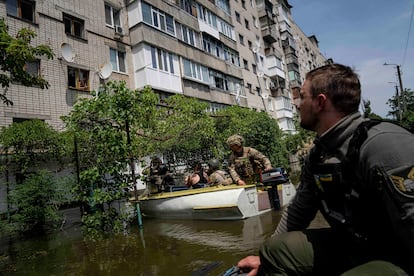

Google Maps users who zoom in on the final stretch of the Dnipro River will find an unusual notice in red letters: “Floods in Kherson.” The eyes of the world have been trained on this area of Ukraine since last Tuesday, when the Nova Kakhovka dam was destroyed, in what is widely suspected to have been the work of Russian troops. Eighty towns and villages along the Dnipro have been flooded and left without basic services, increasing the risk of disease and pollution. But there is another river that is not highlighted by Google Maps and has not been the focus of media attention, although the ramifications of the dam breach are the same: the Ingulets, a tributary of the Dnipro and via which catastrophe has also struck 50 kilometers (31 miles) further north.
The amount of water that has burst the banks of the Dnipro is so immense that the width of the river has increased by several kilometers up to its mouth, where it discharges into the Black Sea. The losses have been more material than human, largely attributable to the fact that populations in the municipalities along the river have been emptying since the Russian invasion in 2022 because the Dnipro marks the front line in this area. On the eastern bank is the Russian Army and on the western bank, the Ukrainian Army. But the power of the floodwater has been such that it has swept away communities and inundated thousands of hectares far to the north of the battlefront, across the flow of the Ingulets.
Brothers Serhii and Oleksandr Nomirovsky record videos of their sunflower fields three times a day, as if in disbelief that fate has struck them again. They have been doing this since Wednesday, when the water levels began to rise in the town of Snihurivka, 40 kilometers (25 miles) as the crow flies from the Dnipro. By Thursday morning, their 160 hectares of crops were submerged. They are not alone; thousands of farmers face ruin after the destruction of the Nova Kakhovka dam.
Farmers in three villages in the area confirmed that their fields have been left without irrigation because the Ingulets pumping stations, which supply water to the main agricultural canal in the Mykolaiv region, have been rendered unusable. In the village of Romanovo-Bulhakove, there is no water to feed grain crops, even though the fields are 100 meters from the river. The three farmers who spoke to EL PAÍS did not appear too concerned: in 2022 they were unable to work their land either as the area was under Russian occupation.
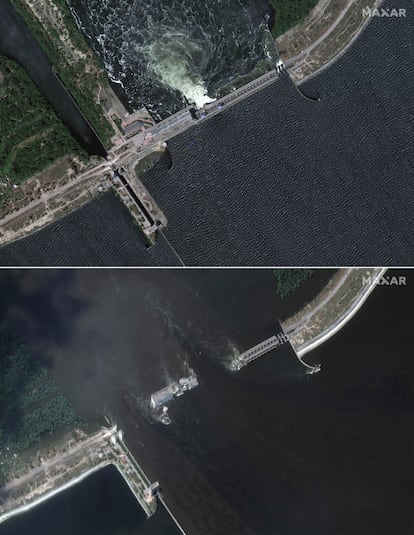
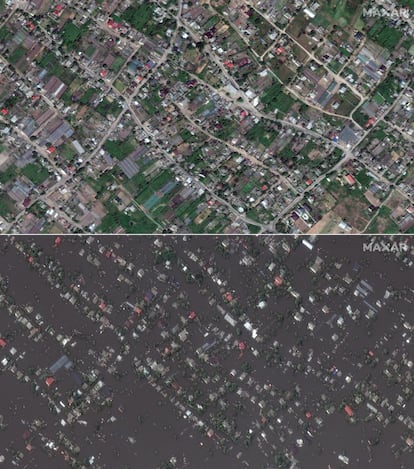
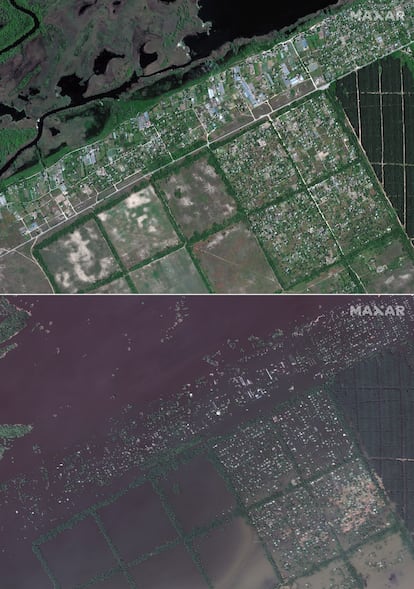
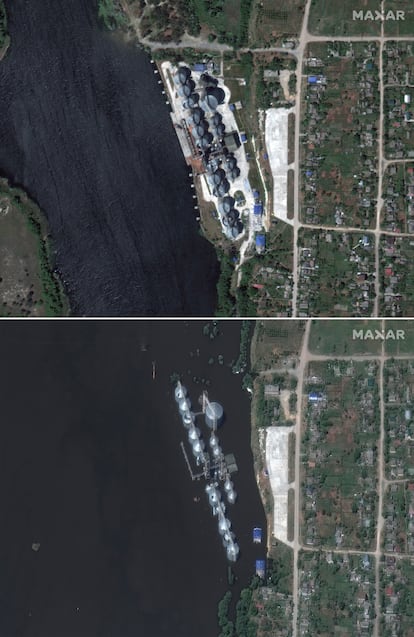
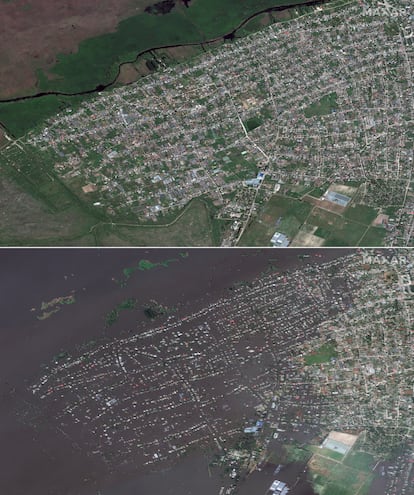
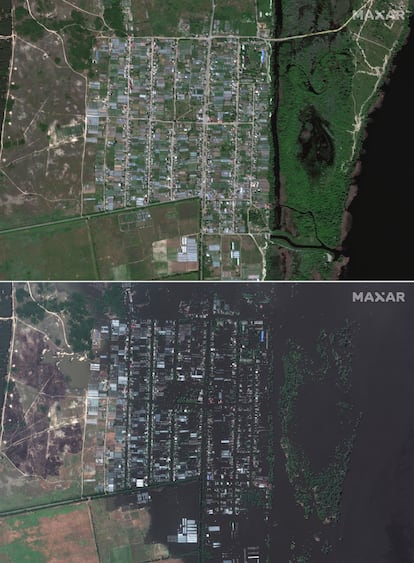
“For those who depend on the Kakhovka water channel, the situation is bleaker; for them it may be the end,” says Serhii. It is anticipated that following the dam breach, the water resources of its reservoir will be expended within the next two weeks, Svetlana Denisuk, who owns two hectares of strawberry fields north of Nova Kakhovka, told this newspaper on Wednesday. According to data from the Ministry of Agrarian Policy and Food, 94% of the irrigation network in the Kherson region, 74% in Zaporizhzhia and 30% in Dnipropetrovsk will run dry.
The Nomirovsky brothers’ land in Mykolaiv province is dependent on water from the Ingulets, but their situation is no better. Their example is paradigmatic of the perpetual crisis facing farmers in Ukraine since Moscow launched its invasion in February 2022. Snihurivka was occupied by the Russians and the Nomirovsky family left the region. When the municipality was liberated last November, they returned to find their fields burned, machinery smashed and tractors stolen by the invading troops. Their fields were mined. The priority for the government is to clear urban areas and strategic infrastructure, then attention will turn to agricultural land. To speed up the resumption of cultivation, the brothers paid a military brigade that agreed to quickly demine their hectares.
They spent their savings on restarting their business, but the water, now a weapon of war, has shattered any dreams of returning to normality. Experts from the Ministry of Agriculture have told them they expect their fields to be ready for ploughing again in August. In the meantime, they need funding but they did not apply for state aid, which is dependent on European funds. The reason, they say, is a lack of trust in the subsidy distribution system. “It is our understanding that aid is allocated according to whether or not you bribe the right people, and we don’t want to get involved in that,” says Serhii.
The Ukrainian government has also emphasized that pollution caused by rising water in the Dnipro will be a major problem. Serhii and Olesksandr admit that they do not know when they may be able to start growing their sunflowers again.
But in the Ingulets, according to Ukrainian Army lieutenant Stepanov, the officer in charge of the evacuation of Afanasiivka, the effects will be the same. “The water that has arrived is toxic, because of chemical materials from industrial areas, fecal waste from Kherson and also because of the cemeteries that the water has washed away.” The village was cut off by the floodwaters and two days later, the evacuation of its residents is still ongoing. The water, according to Stepanov’s calculations, was rising by 10 centimeters an hour on Thursday and is expected to start receding on Sunday. Around the evacuation point, dead fish and Russian ammunition boxes, which the current has carried away from Nova Kakhovka, are piling up.
In Snihurivka, Tatiana Kisminko weeps because the flood has washed away her beehives and a monument to a local partisan who was shot by the Nazis during World War II. Kisminko has been marking the advance of the water on the asphalt of her street: according to her measurements, the Ingulets is swallowing 20 centimeters of her village every 10 minutes. All the bridges that crossed the river have disappeared, leaving the provinces of Mykolaiv and Kherson cut off, meaning Kisminko cannot help her friends who live in Novovasylivka, a neighboring village. There, isolated, they continue to care for their livestock: the cows have been moved into the soccer stadium and the pigs into the schoolyard, Kisminko says.
The bridge that connects Barativka and Yelizavetivka has also been submerged. Locals say that the width of the Ingulets at that point has increased from 50 meters to 1,000m. On Thursday, the army was preparing to raise a chain of boats to rescue the stranded residents. At the same time, Oleg, who lives in Kherson, was getting into a small plastic boat to inspect his grandmother’s house, which has been under water since Wednesday. Along the way he rescued two abandoned dogs that were too scared to try and swim to shore. “This house is my childhood, where I spent so many summers, and now it’s gone,” Oleg mused, holding back tears, as he paddled back to dry land.
Sign up for our weekly newsletter to get more English-language news coverage from EL PAÍS USA Edition
Tu suscripción se está usando en otro dispositivo
¿Quieres añadir otro usuario a tu suscripción?
Si continúas leyendo en este dispositivo, no se podrá leer en el otro.
FlechaTu suscripción se está usando en otro dispositivo y solo puedes acceder a EL PAÍS desde un dispositivo a la vez.
Si quieres compartir tu cuenta, cambia tu suscripción a la modalidad Premium, así podrás añadir otro usuario. Cada uno accederá con su propia cuenta de email, lo que os permitirá personalizar vuestra experiencia en EL PAÍS.
¿Tienes una suscripción de empresa? Accede aquí para contratar más cuentas.
En el caso de no saber quién está usando tu cuenta, te recomendamos cambiar tu contraseña aquí.
Si decides continuar compartiendo tu cuenta, este mensaje se mostrará en tu dispositivo y en el de la otra persona que está usando tu cuenta de forma indefinida, afectando a tu experiencia de lectura. Puedes consultar aquí los términos y condiciones de la suscripción digital.








































